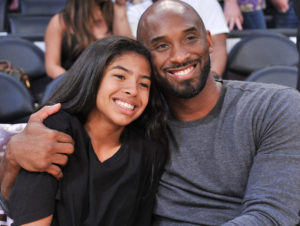This is a really tough one. The tragic deaths of basketball legend Kobe Bryant, his 13 year old daughter Gianna, and seven others, including two of Gianna’s basketball teammates, their moms and one of their dads, has us all reeling. This hits us as basketball fans, as parents, as human beings. Hard to wrap our heads around it.
And if it is hard for us, it may be even harder for our children. Not only have many of them lost a basketball hero, they’re dealing with the fact that his 13 year old died with him. The stuff of which nightmares are made. So, how do we talk with our children about this?
Psychology Today offers some suggestions for parents to talk about death with their children, which I’ve adapted below. Maybe you won’t need any of them, maybe they can even be helpful to your own reactions to this tragedy. Good to have them just in case.
-
- Be prepared for a variety of emotional responses. Your child may be upset, and perhaps even angry as coverage of this tragedy continues. Accept your child’s emotional reactions, and don’t make him or her feel ashamed of having them.
- Monitor how the information is shared and received. Media coverage of this promises to go on for quite some time, as the investigation of the helicopter accident proceeds and the many tributes begin. If you feel as if your child is getting overwhelmed by the coverage, make sure he or she doesn’t have unlimited access to it. If you are nursing your own obsession, make sure you do it away from the children.
- Be comfortable saying, “I don’t know.” Having all the answers is never easy, especially during a time of such heartache. It’s helpful to tell your child that you may not know about certain things, like, “Why did they take the helicopter ?” “What will happen to the families left behind?” ,” Why did this happen?” or other unanswerable questions.
- It’s OK to cry. If you and/or your children feel sad about this and want to cry, then you should cry. You can cry together. It’s healthy and healing.
- Let your child react in his or her own way. Don’t worry about your child’s reaction. He can be quiet, he can be sad, of he can seem unaffected even if he was a huge Kobe fan. This news will affect young and old in a variety of ways. There is no right way to react.
- Prepare to talk about thoughts and feelings often. If your child is affected by this news it is likely that you’ll have to focus on it for days, and perhaps weeks to come. Check in and be available for ongoing discussions.
- Don’t avoid connecting with your child because you feel sad or helpless or uncomfortable, or don’t know what to say.Sometimes a knowing look can be a powerful connection. Even a touch or a hug can offer great comfort.
Speaking of comfort, here’s a poem from the great Maya Angelou (1928-2014) which she wrote as a response to loss. We will declare today an unofficial Thoughtful Thursday and reprint it here for you to enjoy. Share it with your children and may it comfort us all.
When Great Trees Fall
When great trees fall,
rocks on distant hills shudder,
lions hunker down
in tall grasses,
and even elephants
lumber after safety.
When great trees fall
in forests,
small things recoil into silence,
their senses
eroded beyond fear.
When great souls die,
the air around us becomes
light, rare, sterile.
We breathe, briefly.
Our eyes, briefly,
see with
a hurtful clarity.
Our memory, suddenly sharpened,
examines,
gnaws on kind words
unsaid,
promised walks
never taken.
Great souls die and
our reality, bound to
them, takes leave of us.
Our souls,
dependent upon their
nurture,
now shrink, wizened.
Our minds, formed
and informed by their
radiance,
fall away.
We are not so much maddened
as reduced to the unutterable ignorance
of dark, cold
caves.
And when great souls die,
after a period peace blooms,
slowly and always
irregularly. Spaces fill
with a kind of
soothing electric vibration.
Our senses, restored, never
to be the same, whisper to us.
They existed. They existed.
We can be. Be and be
better. For they existed.
Maya Angelou






